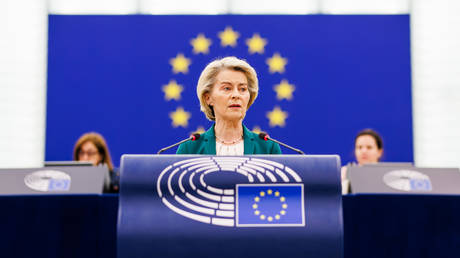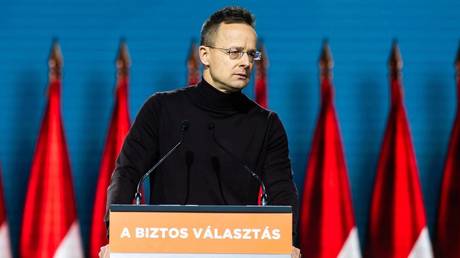
The separate initiatives come from far-right and far-left parliamentary groups
European Commission President Ursula von der Leyen is set to face two separate no-confidence votes at the EU Parliament in early October, Politico reported on Tuesday, citing an internal email from the legislature’s president, Roberta Metsola.
The motions of censure are scheduled to be debated during the plenary session from October 6 to 9. The motions submitted against von der Leyen, a divisive figure in Brussels, come from both right and left – the Patriots for Europe and The Left parliamentary groups.
The Patriots for Europe have accused her of lacking transparency and accountability, particularly in relation to the EU’s trade agreements with the United States and the South American trade bloc Mercosur. “The EU is weaker today than ever due to the persistent failure of the president of the Commission to cope with the most pressing challenges,” the group stated in its motion, as quoted by Politico.
The Left has also criticized von der Leyen’s trade policies but placed greater emphasis on the EU’s handling of the conflict between Israel and Hamas in Gaza. The group argued that the Commission has shown inaction and failed to hold Israel accountable.
Both motions were filed at midnight on September 10, which was the earliest opportunity following a previous no-confidence vote in July. Von der Leyen survived that vote, which was initiated by Romanian right-wing MEP Gheorghe Piperea and focused on the so-called Pfizergate scandal. The controversy stemmed from the disappearance of text messages between von der Leyen and Pfizer’s CEO during negotiations for a major Covid-19 vaccine procurement.
Von der Leyen, a former doctor and German defense minister, was accused of a lack of transparency in negotiating the multi-billion-euro deal. She dismissed the allegations against her as “simply a lie” and branded her critics “conspiracy theorists.”
The initiative ultimately failed, supported only by 175 MEPs with 360 voting against it. To pass, two-thirds of the 720 MEPs must vote in favor. No-confidence motions used to be quite rare at the EU Parliament. Prior to the July vote, such a motion was last tabled against Jean-Claude Juncker in 2014.




